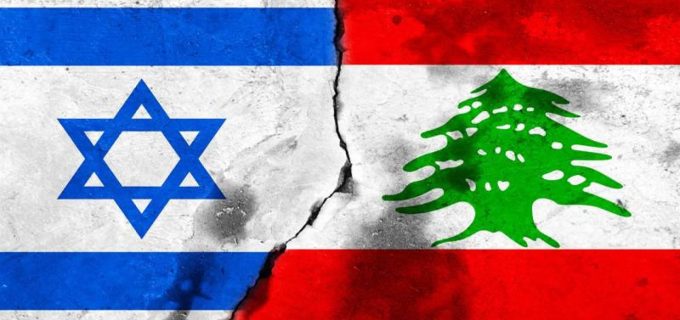On September 1, the Lebanese Hezbollah announced the targeting of an Israeli armored vehicle near the Lebanese borders, a week after it accused the Israeli entity of carrying out an attack by two drones on its stronghold near Beirut and killing two of its members in a raid on Syria.
Hezbollah’s attack on Israeli armored vehicles was followed by an artillery strike with more than 100 shells that targeted Lebanese villages. These strikes raised fears of a possible new war between the two sides, like the war of 2006, which erupted after Hezbollah captured two Israeli occupation soldiers on July 12. The Israeli entity counterattacked at the time with a devastating 33-day offensive, killing 1,200 Lebanese people, most of whom are civilians, along with 160 occupiers, most of whom are soldiers. The war ended with the issuance of UN Security Council Resolution 1701, which stipulated the end of the war.
These confrontations come without declared objective justifications, raising questions about the backgrounds of the military escalation between the two sides, and the extent to which it is linked to international files that go beyond the borders of Lebanon. Could it be explained by linking it with security reasons only? Or has it a greater link with the elections and the political rivalry in the Israeli interior? What are the contexts of this escalation and its relation to the conflict between Iran and the United States?
The contexts of escalation between Hezbollah and the Israeli entity
More than a decade after the last war between Hezbollah and the Israeli entity, and just a week after the last clash, the downing of the Israeli drone has renewed fears of a possible escalation of the confrontation between the two sides, complicating the security situation.
Despite the occurrence of confrontations between the two sides in 2015 and 2016, after Hezbollah targeted Israeli entity military vehicles that were passing near the occupied Shebaa Farms, in response to the Israeli entity’s raids targeting Hezbollah fighters in Syria, these confrontations did not develop into an all-out war, and were considered as part of the counterattack and deterrence policy. However, the current escalation came within contexts and circumstances that are not directly limited to the level of conflict between Hezbollah and the Israeli entity, but also within a deliberate escalation policy between external parties that could lead to a proxy war.
The first indication of these contexts is linked to the accusation of the Iraqi Shiite Popular Mobilization Forces, affiliated to Iran, against the Israeli entity of launching raids by two drones on the point of an Iran-supported Shiite faction near the Syrian-Iraqi borders. This was followed by the Israeli entity’s targeting of Hezbollah fighters in Syria, as well as the southern suburbs, Hezbollah’s stronghold in Lebanon. These attacks coincided with the intensification of US economic sanctions on Iran, most recently on August 29, when Washington imposed sanctions on a Lebanese bank it accused of providing banking services to Hezbollah, whose officials are subject to the US sanctions.
Hezbollah: Between security and political motives
The Israeli entity’s attacks were not the first of their kind, and Hezbollah’s counterattack was expected. However, what could be considered new in this matter are the timing, the quality of the attack, in addition to the contents of the speeches delivered by Hezbollah’s Secretary-General Hassan Nasrallah, as it wasn’t possible to ignore the attacks of the Israeli entity. Moreover, the violent counterattack is not possible, especially in light of the deteriorating security and economic situation in the region. Therefore, Hezbollah resorted to the adoption of a direct and limited military counterattack policy, represented in two military operations at close time intervals.
The contexts of this attack can be understood by analyzing the content of the verbal war between Hezbollah’s Secretary-General Hassan Nasrallah and Israeli Prime Minister Benjamin Netanyahu. Nasrallah launched his threats against the Israeli entity and linked them to what is happening in Iraq and Syria, which shows that Hezbollah is not only talking about the Lebanese scene alone, but also adopts a discourse of Iranian influence in the region.
In contrast, Netanyahu responded by threatening that any attack against the Israeli entity would cost an attack against Lebanon. At the same time, he addressed his threat and speech to Iran’s Quds Force commander, Qasem Soleimani, by saying: “Pay attention to your words, and pay more attention to your actions.” These whereabouts indicate that the clash between Hezbollah and the Zionist entity does not directly involve the two sides as much as it carries messages that the current conflict is linked to the US-Iranian conflict, which started since the US’s withdrawal from the nuclear weapon deal in May 2018.
On the other hand, the timing of Hezbollah’s counterattack against the Israeli entity’s attacks has been driven by political motives. Since its involvement in the sectarian conflict in Syria and Iraq, Hezbollah has been trying to polish its image from time to time, by depicting itself as a persistent force in the region resisting the Israeli entity. This can be confirmed by the coincidence of Hezbollah’s attacks and the speeches of its Secretary-General Hassan Nasrallah with Ashura, which carries religious, historical and political significance.
Israeli entity’s position: between the desire for escalation and electoral gains
The Israeli entity’s escalation against the Lebanese Hezbollah comes as part of its policy in the face of Iran’s influence and threat in the region. Despite the increasing frequency of the Israeli entity’s shells in its response to the targeting of the armored vehicle, it did not continue its attack. This is due to the major calls raised by Lebanese Prime Minister Saad Hariri, Hezbollah’s most prominent enemy, to the United States and France to intervene to stop these large-scale raids that targeted parts of Lebanese villages and caused casualties.
The Israeli entity’s statements downplayed the importance of the downing of the drone, and confirmed that Hezbollah could not cause any information breach if it gets access to the drone. Despite the obvious security precautions of the Israeli authority, which included warning citizens living near the Lebanese border and providing them with shelters, these preparations were not as serious as expected. This indicates that no direct confrontations will take place and that such clashes have more political than security dimensions.
The Israeli escalation against Hezbollah may be part of its policy aiming to exert pressure on the US to change its policy regarding the Iranian threat in the region. President Trump tends to focus on economic and political pressures, but does not rule out the possibility of finding a solution through dialogue. However, the Israeli side tends to adopt the military solution in dealing with the Iranian issue in the region. Thus, these confrontations would push the Iranian side to adopt an attack policy and justify the act of waging war in the region whose goal is to deter Iranian influence and provide US protection for the Israeli entity.
On the other hand, the escalation of the Israeli entity against Hezbollah is compatible with the political motives occurring before the elections scheduled for September 17. Experts pointed out that many Israeli candidates started tackling security escalation so often to achieve political goals.. Therefore, the nature of the limited confrontation between both parties can be explained through focusing on political motives along with the security dimensions.
International positions and reactions
International parties condemned the escalation between the two sides, and considered such position a serious an alarming threat to the stability of the region. The US expressed concern about this escalation, but chose to support the Israeli entity considering escalation as a self-defense measure. The UN forces in southern Lebanon (UNIFIL) called for self-restraints to avoid any complications. The French Foreign Ministry confirmed intensifying its communications in the Middle East to avoid any escalation between the parties.
Iranians stood in support of Hezbollah, prompting an Iranian official to consider that the escalation revealed the extent to which the party is committed to its policy towards the Israeli entity aiming to protect Lebanon against any foreign interference. Both Bahrain and the UAE condemned the escalation of Hezbollah. Bahrain asked its citizens to leave Lebanon to avoid any possible harm in case the escalation continues, while UAE Minister of State for Foreign Affairs,Anwar Gargash, has criticized the escalation, classifying it as an act carried out outside state jurisdiction, indirectly criticizing Lebanese Hezbollah.
Limits to Escalation
Recent confrontations between the two sides have restored old fears of renewed hostilities which could result into a proxy war between Iran and the US, making Lebanon the detached onlooker, but the biggest loser of this war.
Despite the high expectations related to the possibility of turning these confrontations into a all-out war that would affect both sides, the Deputy Secretary General of Hezbollah, Naim Qassem, ruled out such a scenario; given the exceptional circumstances in the region. He considered this escalation as “a response rather than an attack that could lead to war, especially since the 2006 war has caused heavy human losses for Lebanon, in addition to the destruction of infrastructure, which has negatively affected the economy. On the other hand, the political and security context of the party today is quite different from that of the 2006 war. The main reason for this change is the party being directly caught inside the interventionist actions of Iran both in Iraq and Syria.
The Israeli side is also aware that any direct confrontation with Hezbollah at the present time will be different from the one that took place in 2006, given the military and combat capabilities Hezbollah managed to acquired due to its involvement in Iran’s wars in Syria and Iraq. However, at the same time Israel does not overlook the need to curb Iranian influence and reach in the region by carrying out limited military operations in its areas of influence. The escalation of the Israeli entity against Hezbollah indicates that its policy towards the party has changed, considering it a main spearhead in the Iranian threats in the region.
Conclusion
Considering the contexts and motives of the confrontation between the two sides, one clearly notices that political dimensions highly contribute to fueling the conflict between Hezbollah and the Israeli entity. Despite ruling out any possible all-out war scenario between the parties, one shall understand and recognize the motives driving Hezbollah during its recent confrontations, which originally spring from Lebanon, but at the same time are directly linked to the Iranian presence in the region, following Qassim’s statements. The party does not want a real escalation that could lead to war, because that will not only threaten its own existence, but also Iranian projects. Iran is not capable of funding a new front and is already exhausted by economic pressures, but at the same time it will not hesitate to use any available option, whether linked to the economic side, such is the case with the tanker battles, or the security side by targeting the Israeli entity. These moves aim to communicate clear messages to the US refusing to accept being the only victim of economic sanctions.
The response of the Israeli entity has also been limited and consistent with the new US policy President Trump has adopted after dismissing his National Security Adviser, John Bolton, who was adopting the policy of war and attack and intensifying economic sanctions on Iran. This change comes in preparation for a forthcoming dialogue between Trump and his Iranian counterpart Hassan Rouhani, especially since the economic sanctions have not met the desired effect despite being implemented for a long time.







